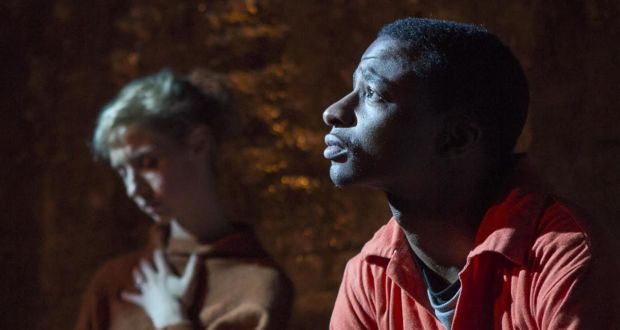Pros: Familiar stories from the Bible take on a different heft and empathic resonance when set in contemporary America.
Cons: Those who know these stories well might find their reinterpretations a little predictable. A hard-working ensemble dives into character study and the confessional, making their biblical counterparts much more relatable.
Summary
Rating
Good
Testament is framed both as a confessional and a sort of Alcoholics Anonymous for biblical characters that playwright Tristan Bernays feels have been ‘overlooked’ in the Good Book. They aren’t unknown figures by any stretch — Bernays himself plays an adult Isaac, Abraham’s son, here the son of a devout pastor who once tried to sacrifice him out of obedience to a God invisible to everyone else; Lot’s two daughters (Peta Cornish and Celeste Dodwell) are a pair of Southern belles escaping a city erupting with riots, analogous to Sodom and Gomorrah, who are then subject to terrible acts of abuse by their father; one of the thieves crucified with Christ (a convincing Simon Manyonda) is a bitter, disenfranchised man on death row whose neighbouring cellmate happens to be the son of God. Each takes turns to deliver a monologue (in the case of the sisters, a duologue) on their side of the story.
It’s a hard-working attempt to situate these biblical figures in our contemporary understanding of the world, giving us an opportunity to grapple with the relative judgment or the fallout they must have been subjected to at the time. Through his characters, Bernays is able to touch on a multitude of contemporary themes — the extremes of fundamental religion, sexual abuse within the family, and questions relating to the death penalty — while striving to keep his characters as human and as relatable as possible. But because each story is such a direct map of past onto present, the stories tend to fall into the same formulaic frame, where each retelling becomes an exercise in plausibility and modern equivalences rather than a deeper emotional insight into the characters and what’s at stake. Much of the impact of each vignette rests on the actor’s ability to invite the audience in and establish an emotional connection; Isaac (Bernays) and the thief (Manyonda) do this capably, but the focus on one of Lot’s daughters over the other means that Celeste Dodwell gets significantly more stage time and emotional depth than Peta Cornish.
A testament may be proof of a fact, in the case of the Old and New Testaments, but it’s also part of a last will and testament, a dying person’s final act — one inked when there is nothing more to gain or to lose. This is where Testament’s strengths lie — it’s that sense of unburdening and confiding that holds the play together, a catharsis that comes with giving voice to a buried grudge or a painful family secret. The Bible’s characters may be human, but knit together their stories become divine.
Director: Lucy Jane Atkinson
Writer: Tristan Bernays
Producer: Darius Thompson
Music: Ivy Davies
Booking Information: The show has now completed its run.
 Everything Theatre Reviews, interviews and news for theatre lovers, London and beyond
Everything Theatre Reviews, interviews and news for theatre lovers, London and beyond



